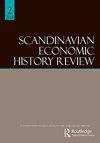The German construction industry and industrial self-responsibility in occupied Europe, 1939–45
IF 0.5
Q4 ECONOMICS
引用次数: 0
Abstract
ABSTRACT This article enquires into the role of private German businesses in the administration of Nazi-occupied Western and Northern Europe during the Second World War. It is argued that the National Socialists were able to rule over occupied Europe with a remarkably low number of administrative personnel because they trusted private industry with central administrative responsibilities and tasks. The focus will be on the German construction industry working under the paramilitary construction unit Organisation Todt, as no other sector relocated its activities to such a degree to the occupied territories. Under the slogan of ‘industrial self-responsibility’, German construction firms played a crucial role as bridgeheads and mediators, especially in the early phase of the occupation, helped to draft procurement contracts for construction projects, to control prices and entrepreneurial profits, to supervise local sub-contractors, and finally, to recruit and supervise forced labour. By investigating these aspects, the article adds not only to our understanding of the German administration of occupied Europe, but also of the functioning of the Nazi state in general. Moreover, the article highlights the consequences of industrial self-responsibility for state-business relations in the Third Reich.1939–45年被占领欧洲的德国建筑业和工业自我责任
本文探讨了德国私营企业在第二次世界大战期间纳粹占领的西欧和北欧的管理中所扮演的角色。有人认为,国家社会党之所以能够以极低数量的行政人员统治被占领的欧洲,是因为他们信任私营企业承担中央行政责任和任务。重点将放在准军事建筑单位Todt组织下的德国建筑业上,因为没有其他部门将其活动转移到被占领土。在“工业自我责任”的口号下,德国建筑公司发挥了至关重要的桥梁和调解人作用,特别是在占领初期,帮助起草建筑项目的采购合同,控制价格和企业利润,监督当地分包商,最后招募和监督强迫劳动。通过调查这些方面,这篇文章不仅增加了我们对德国对被占领欧洲的管理的理解,也增加了对纳粹国家总体运作的理解。此外,文章强调了工业自我责任对第三帝国国家商业关系的影响。
本文章由计算机程序翻译,如有差异,请以英文原文为准。
求助全文
约1分钟内获得全文
求助全文
来源期刊

SCANDINAVIAN ECONOMIC HISTORY REVIEW
ECONOMICS-
CiteScore
1.60
自引率
16.70%
发文量
20
期刊介绍:
Scandinavian Economic History Review publishes articles and reviews in the broad field of Nordic economic, business and social history. The journal also publishes contributions from closely related fields, such as history of technology, maritime history and history of economic thought. Articles dealing with theoretical and methodological issues are also included. The editors aim to reflect contemporary research, thinking and debate in these fields, both within Scandinavia and more widely. The journal comprises a broad variety of aspects and approaches to economic and social history, ranging from macro economic history to business history, from quantitative to qualitative studies.
 求助内容:
求助内容: 应助结果提醒方式:
应助结果提醒方式:


